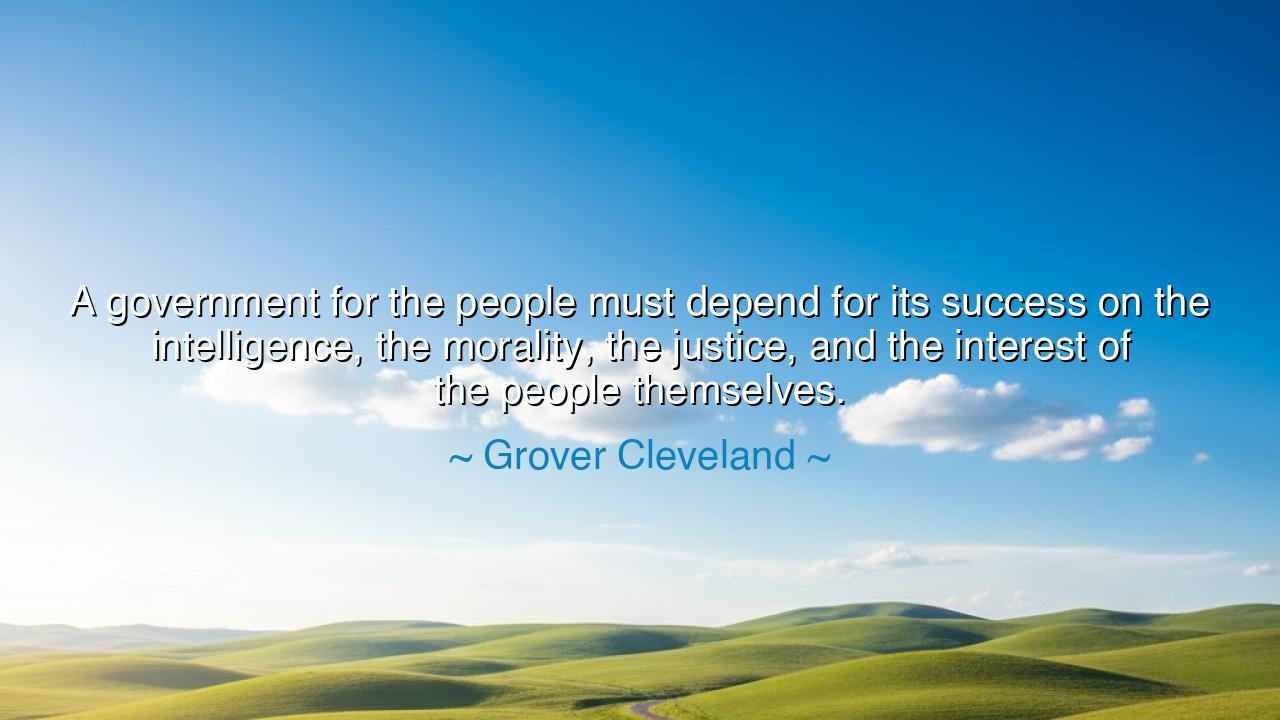
A government for the people must depend for its success on the
A government for the people must depend for its success on the intelligence, the morality, the justice, and the interest of the people themselves.






"A government for the people must depend for its success on the intelligence, the morality, the justice, and the interest of the people themselves." Thus spoke Grover Cleveland, the twenty-second and twenty-fourth President of the United States — a man remembered not for grandeur or ambition, but for integrity and steadfast devotion to principle. In these words, he reminds us that the strength of a republic lies not in the majesty of its leaders, but in the virtue of its citizens. Government, he tells us, is no distant machine; it is a mirror reflecting the soul of its people. If that soul grows ignorant, corrupt, or selfish, then no constitution, however noble, can save it.
Cleveland’s insight was born from the trials of leadership in a young nation wrestling with power and principle. He governed during an age of political machines and rapid industrial change — a time when wealth tempted the conscience of democracy and special interests sought to bend the public will. Against this tide, Cleveland stood firm, often at great personal cost. He vetoed bills that served the few over the many and warned that public service must never become private gain. It was from this crucible of corruption and reform that his words emerged — a call for the people to remember that liberty requires not only rights, but responsibility.
The meaning of his words runs deep and timeless. A government for the people is more than a promise; it is a covenant. It requires that the governed possess the intelligence to discern truth from deception, the morality to act with conscience, the justice to treat all as equals, and the interest — that is, the active engagement — to care for the destiny of their nation. A people who neglect these virtues invite decay. For ignorance blinds them to tyranny, immorality corrodes their unity, injustice poisons their laws, and apathy delivers their freedom into the hands of the ambitious. The success of democracy, Cleveland warns, is not written in parchment, but in the hearts of the people who live under it.
History offers many examples of this truth. Consider the fall of the Athenian democracy, which once shone as the beacon of freedom in the ancient world. In its early days, Athens was guided by wise citizens who valued learning and virtue. But over time, the people grew careless, swayed by flattery and rhetoric instead of reason. They allowed demagogues to stir their passions and lead them into reckless wars. In the end, their freedom was lost — not because of invasion, but because of the people’s failure to govern themselves wisely. Cleveland’s warning echoes their tragedy: that democracy perishes not from outside enemies, but from the moral and intellectual weakness within.
Yet the same truth has also given rise to greatness. In the early days of the American Republic, the nation was poor, its future uncertain. But its people — farmers, tradesmen, teachers, mothers, soldiers — possessed the virtue and intelligence to nurture liberty through faith, labor, and sacrifice. They read, they debated, they voted, and they served. They understood that self-government demanded self-discipline. Through their morality and justice, they laid the foundation for a nation that would become a symbol of hope across the world. Their example proves Cleveland’s point: when the people rise to the height of their responsibilities, good government naturally follows.
The power of Cleveland’s insight lies in its humility. He does not glorify government as a savior, nor condemn it as an enemy. He recognizes that it is but a reflection — neither more wise nor more wicked than those who compose it. “A government for the people,” he says, “depends on the people.” In those few words lies the secret of every enduring republic. It is not the brilliance of laws, nor the eloquence of leaders, that sustains liberty, but the daily choices of ordinary men and women — their honesty in small things, their courage in hard times, their willingness to act justly even when no one watches.
The lesson is clear and urgent: if you wish for good government, first be a good citizen. Educate your mind, for ignorance is the tool of the tyrant. Guard your morality, for corruption begins in the heart. Practice justice in your dealings, for fairness among individuals builds fairness in nations. And above all, care deeply for your community, for apathy is the slow death of freedom. Each act of conscience, each honest word, each vote cast with integrity — these are the stones that pave the road of republican success.
So remember the wisdom of Grover Cleveland: that government is no more noble than its people, and the destiny of a nation lies not in its rulers, but in the character of those who are ruled. When intelligence, morality, justice, and interest flourish among the citizens, freedom stands firm as a mountain against the winds of time. But when those virtues fade, no law, no leader, no constitution can preserve it. Therefore, let every generation renew the covenant of self-government — for in the end, the fate of the Republic rests not in the halls of power, but in the hearts of its people.






AAdministratorAdministrator
Welcome, honored guests. Please leave a comment, we will respond soon